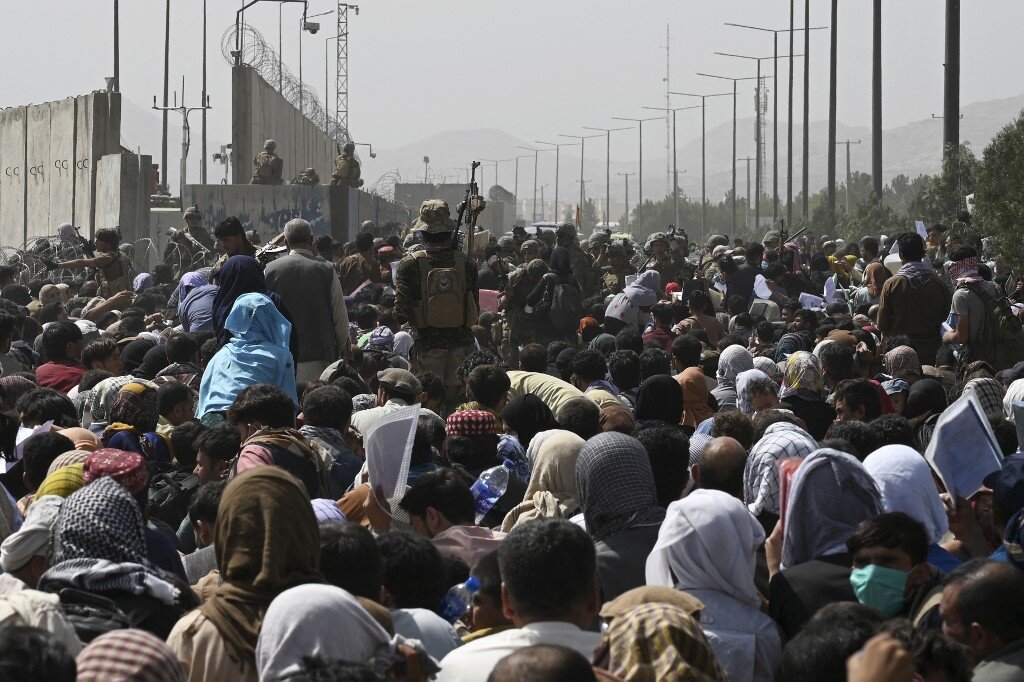Sahraa Karimi, 37, is an easy target for the Taliban.
Born in Afghanistan, she became the first Afghan woman to head the state-run Afghan Film Organization and earn a PhD in filmmaking. Throughout her career, she has been vocal about injustice and women’s rights.
Being an outspoken woman has become life-threatening in a country that the radical Islamist movement seized with stunning speed earlier this month.
On Aug. 15, when the Taliban marched into the capital city of Kabul and the Afghan government collapsed, Karimi packed up her life in a suitcase and ran, along with tens of thousands of desperate Afghans.
She and her family were lucky enough to get on a flight to Istanbul and then to Kyiv, where they have found refuge.
After she arrived in Ukraine, Karimi spoke with the Kyiv Post about the role President Volodymyr Zelensky’s office played in her family’s evacuation, what the Taliban’s reign means for Afghan culture and youth, and her plans to return home despite the danger.
Fleeing Kabul
Hours before Karimi had to leave her old life behind, it was a regular day in Kabul.
People went about their lives, going to work, school and shops. Karimi stopped by a bank to withdraw some cash. Suddenly, the bank’s manager, Karimi’s friend, ran up to her, his eyes full of tears.
“The Taliban is inside the city. They’ve surrounded us. You should go home,” the manager told Karimi, as gunshots began firing in the streets. He took her out through the back door and tried catching a cab, but no car wanted to take her.
She fled on foot, filming herself along the way. The video of her running through the chaotic streets of Kabul, which she posted on Instagram, has been watched over 1.3 million times.
Hours later Karimi tweeted: “Hey (people) of this big world, please do not be silent, they are coming to kill us.”
Karimi came home and told her family in Afghanistan — her brother Hussein and his five daughters — as well as her two assistants from the Afghan Film Organization to get ready as fast as they can.
“I had less than an hour to pack, so I grabbed my laptop, my shoes, a few dresses and my education documents and ran,” Karimi told the Kyiv Post.
She then reached out to Wanda Hrycova, the president of the Slovak Film and Television Academy. Karimi knows Hrycova from the years she spent in Slovakia, earning her bachelor’s and master’s degrees, as well as a PhD in film.
Hrycova told Karimi she spoke with the Office of the President of Ukraine and that a plane would be departing for Ukraine shortly. But actually reaching the plane proved impossible.
As thousands of Afghans flocked to Kabul’s airport, all commercial flights were halted to allow foreign diplomats to be evacuated by the military. What followed was pure mayhem — thousands of families stormed military planes, a desperate few even clinging to the planes’ wings and ultimately falling off to their deaths moments after takeoff.

Afghans gather on a roadside near the military part of the airport in Kabul on August 20, 2021, hoping to flee from the country after the Taliban’s military takeover of Afghanistan. (AFP)
The plane Karimi was supposed to take was stormed by crowds — she and her family and assistants couldn’t make it through. They hid in the chaos at the airport buildings and waited until the next morning.
Meanwhile, the Ukrainian government asked the Turkish government whether the filmmaker’s family could be put on its morning evacuation flight. The next day, Karimi got on a plane to Istanbul, from where a Ukrainian plane took her to Kyiv.
“It really all came from the Ukrainian initiative,” Karimi told the Kyiv Post.
Her family and assistants were given Ukrainian visas. The president’s office paid for their hotel and all accommodations. When Karimi’s brother got sick shortly after evacuation, he was taken to a hospital and the Ukrainian government covered all medical expenses.
“They told us we can stay here until all our issues are sorted,” Karimi said.
Indeed, Ukraine took an active role in evacuating not only Ukrainians, but foreigners, including many Afghans, earning praise from the international media. Since Aug. 15, three Ukrainian planes evacuated over 200 people including journalists, from Kabul to Kyiv.
“The government works every hour to help our citizens. And we will help foreigners too,” Ukraine’s Foreign Minister Dmytro Kuleba wrote on Facebook.
“Ukraine doesn’t leave its citizens behind, and our evacuations from Afghanistan prove this principle once again.”
Culture destroyed
Taliban’s seizure of Afghanistan is bad news for the country’s cultural scene, civil society and women’s rights — all key elements of Karimi’s identity.
“Everything I have worked so hard to build as a filmmaker in my country is at risk of falling. If the Taliban takes power, they will ban all arts. Me and other filmmakers could be next on his hit list,” the filmmaker wrote in her open letter, published on Aug. 13, calling on the world to not be silent about the Taliban’s rapid advance.
The radical group has already begun destroying cultural and historical artifacts, looting the Afghan National Archives, destroying statues, and ordering only Islamic music to be played on the radio.
Back in 1996, the last time the Taliban was in power, the group destroyed much of the National Museum of Afghanistan’s exhibitions, and famously blasted the large statues of Buddhas of Bamiyan with artillery and dynamite. Afghans worry history will repeat itself.
“What’s happening in Afghanistan right now is a catastrophe,” Karimi told the Kyiv Post. “We’ve had a cultural collapse.”
“A lot of young people who are able to think and create — writers, filmmakers, performing artists — a very well-educated young generation, they all just left Afghanistan in this past week, because life becomes very challenging for those who are free souls and who want to create and live in peace.”
Women’s rights erased
The Taliban, notorious for their oppression of women, pledged to respect women’s rights “within the limits of Islam,” without specifying what these limits are, during their first press conference since the takeover.
Karimi refuses to believe the Taliban has changed.
“You’ve seen photos from their meetings. Are there any women there? Respect comes from giving someone the right to participate in decision-making,” she said. “I will believe them when they let me come back and continue my work in Afghanistan.”

An image grab taken from Qatar-based Al-Jazeera television on August 16, 2021, shows Members of Taliban taking control of the presidential palace in Kabul after Afghanistan’s president flew out of the country. (AL JAZEERA / AFP)
Indeed, a wave of repression has already swept through Afghan cities.
In some places, women have been banned from leaving the house without a male relative and forced to wear burqas, which cover their entire body, including the face. Some Taliban commanders forced families to hand over their daughters to marry their fighters. Images of women outside beauty parlors in Kabul have been painted over or ripped off. Female teachers were prohibited from teaching boys, while female journalists were prohibited from appearing on state TV.
When the Taliban entered Kabul, Karimi immediately thought of her nieces, whose future was at grave risk. “I didn’t want them to stay in a society that’s under Taliban control,” she told the Kyiv Post.
Betrayal on all sides
The Afghan government, as well as the current and former American presidential administrations, have all been under fire in the last weeks for letting the situation in Afghanistan deteriorate as quickly as it did. The Taliban walked right into Afghanistan’s cities in a matter of days, encountering little to no resistance.
Karimi stressed that the American withdrawal was perceived as betrayal in Afghanistan, as most Afghans didn’t oppose the American presence and felt safer with U.S. and its allies on the ground.
But the filmmaker didn’t pick sides.
“Everyone is to blame,” she said. “But especially the Afghan government, because we’ve had 20 years and we didn’t use a lot of opportunities. Our politicians were so busy with their own egos, our government was very corrupt. So they just completed the puzzle of collapsing.”
“But I don’t believe a single politician in Afghanistan anymore.” Karimi told the Kyiv Post. “They just play with our lives, fates, and dreams. They play with our country for their own benefit. We’ve been victims of this for the past 20 years, and we are now.”
Uncertain future
The filmmaker plans to send her brother Hussein and his daughters to Canada, where her mother and Hussein’s oldest daughter reside.
After that, Karimi wishes to return to Afghanistan to rebuild the country and support its women.
“If we have an opportunity to return, we have to go to give the Afghan girls hope. We have to show them how to survive under the Taliban regime,” she told the Kyiv Post.
“If the Taliban provides me safety, I will come back. Because someone has to fight and I am a fighter.”
Even so, she acknowledges that her odds of returning are slim. In the meantime, Karimi plans to move to Slovakia, of which she is a citizen, where she can make films and teach.
Regardless of her location, she will always find opportunities to reflect the reality in Afghanistan through her work, she said.
“You cannot forget your motherland. Especially when you are the part of the generation that rebuilt the country. I am not just a film director who makes films. I am an author, and I have always protested against the injustices in Afghanistan.”
“I always raise my voice. I don’t need the Taliban’s acceptance. I am a part of the society, and they’re not. This is our home, and they are guests.”
